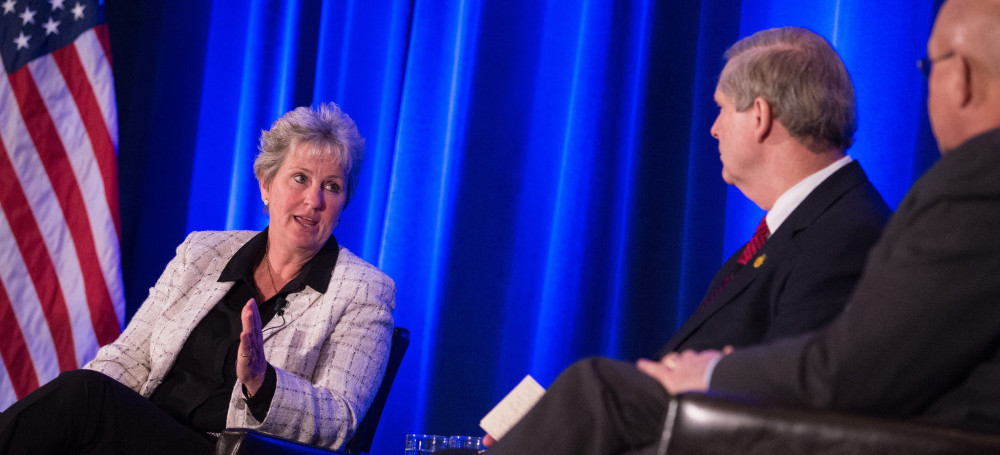The American Farm Bureau Federation is supposed to stand up for farmers. Instead it often stands in the way of a just and sustainable food system.

The American Farm Bureau Federation is supposed to stand up for farmers. Instead it often stands in the way of a just and sustainable food system.
February 24, 2015

After a recent national gathering, delegates discussed their emphatic opposition to federal firearm registration, argued against attempts to address climate change through cap and trade, and decried the so-called “war against Christmas.” Attendees went home with a “lobbyist bible” that defined marriage between a man and woman, called for national voter identification, and demanded the repeal of “Obamacare.”
Was this a gathering of the Tea Party? Or the Conservative Political Action Conference (CPAC)?
No. It was the annual American Farm Bureau Federation’s (AFBF) conference, held last January in San Diego.
The AFBF is America’s largest and most influential agriculture organization. And everyone interested in changing the course of food and farming in this country should be closely watching AFBF’s moves.
The group’s far-right wing ideology is woven deep into its DNA. It’s probably not a surprise to hear that cattle ranchers and large, commodity crop farmers skew conservative, just as organic and sustainable agriculture advocates skew liberal. As the President of the Iowa Pork Producers Association recently told Reuters, conventional farmers are “fiscally conservative and socially conservative … they’re conservative all the way through.”
Most elected politicians vote on food and farming issues based on political ideology and party affiliation. And Republicans overwhelmingly vote to perpetuate the industrial agriculture model and efforts to rollback school nutrition improvements. Whereas Democrats are more likely to support funding for local food initiatives, hunger programs, and conservation.
But when Republicans break from the party line on issues of agriculture–as was the case when several GOP member of the House voted to block the latest farm bill, even though the legislation will funnel billions to corn and other large commodity producers–they have not held accountable at the ballot box by the ag lobby. In fact, new Agriculture Committee Chairman Pat Roberts and new Senate Leader Mitch McConnell have even been rewarded with positions of power.
For as long as these Farm Bureau favorites stay in power, there will be no national food policy that makes improving health and the environment a priority.
And the group not only understands this dynamic, they actively exploit it. In 2014, AFBF came in second only to Monsanto in lobbying Congress on agriculture issues, spending $1.9 million. They can kill federal policies they don’t like and create whole new programs they deem worthy. Because they represent agriculture sectors from livestock to commodity crops, their reach is even greater than other powerhouse farm lobbies like the National Corn Growers Association.
AFBF’s core strength lies in robust state farm bureaus across the country that plug into local governments and mobilize the grassroots. These state agencies are in constant contact with lawmakers and local media applying pressure. They hand out campaign checks and “Friends of the Farm Bureau” awards to politicians and city officials who keep regulations at bay and the subsidies flowing.
The AFBF also appears to wield a great deal of power over the U.S. Department of Agriculture. At their annual convention, AFBF president Bob Stallman showered President Obama’s long serving Agriculture Secretary Tom Vilsack with adoration. One article in the Capital Press reads:
At one point, Stallman called Vilsack on stage, said he was “loyal to the outfit,” and presented him with a “U.S. AG” branding iron. “I know one thing as a fact,” Stallman said. “Secretary Vilsack rides for the brand of U.S. agriculture.”
AFBF’s broader conservative social agenda runs deep, but contradicts the Tea Party on farm subsidies and ethanol mandates. Otherwise, the AFBF is indistinguishable from establishment conservatism—it is cozy with multi-national food companies, favors corporate agriculture over small farmers, support a maze of front and PR groups, and buoyed by trade press that often acts like the industry’s own version of Fox News.
For instance, last month’s conference—and the values shared throughout—were well covered. Capital Press’s Eric Mortenson reported:
This year, Farm Bureau’s Resolutions Committee recommended deleting the “Family and Moral Responsibility” policy, which among other things defines a family as people who are related due to marriage “between male and female.” Delegates from Arkansas, Indiana and Georgia rose in opposition. “I want this back in our book,” an Indiana delegate said. The vote wasn’t even close; the policy was retained. [Emphasis mine.]
While not every large farmer walks AFBF’s party line, many appear to do so because it’s clear, easy-to follow, very organized, and it makes them money.
Gail McSpadden Greenman, national affairs director for the Oregon Farm Bureau sounded downright reverential as she told the Capital Press about the “sacred” process of delegates debating AFBF’s 2015 policy book [PDF].
“This is what tells me what I can support or not support,” Greenman said. “This is like my lobbyist bible.”
The group is not shy about flaunting their influence and aggressive posture. In fact, the AFBF is already looking ahead toward electing a president who shares its core values.
As AFBF President Bob Stallman said during January’s conference. “By this fall, the focus will be squarely on the 2016 elections. All of this means that Farm Bureau members will need to be aggressive, and we will need to begin our advocacy efforts as soon as possible …”
You can keep abreast of the American Farm Bureau Federation’s latest moves on Twitter. Its 2015 policy book is also worth the read. For better or worse, the agenda laid out there will influence much of what lawmakers and the administration consider in the next year for food and farm policy.

October 9, 2024
In this week’s Field Report, MAHA lands on Capitol Hill, climate-friendly farm funding, and more.
October 2, 2024

October 2, 2024

October 1, 2024

September 30, 2024

September 25, 2024

September 25, 2024

Like the story?
Join the conversation.